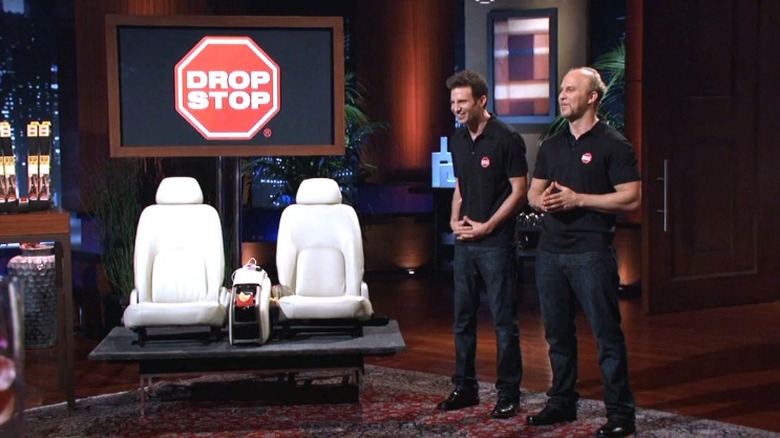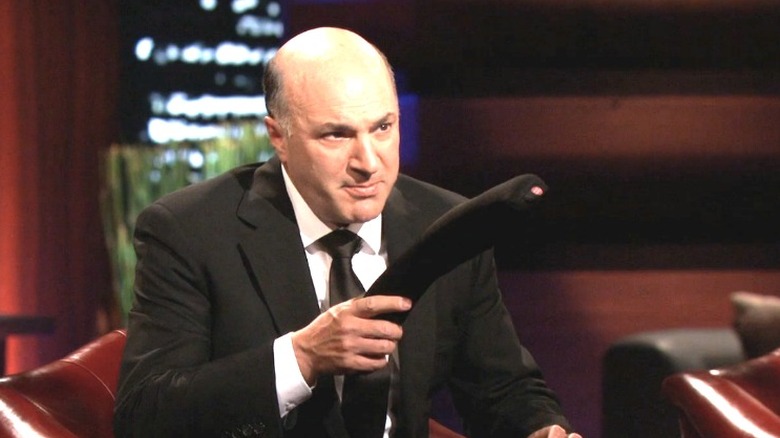Whatever Happened To Drop Stop After Shark Tank?
It's happened to the best of us. You're driving along, minding your own business, eyes forward, hands placed firmly at 10 and 2, when suddenly you hear a thunk. It's not, thankfully, an engine thunk, or a small, furry body in the road thunk, but it's a note you know all-too-well: the dreaded sound of something falling in between your car seat and your center console, or what entrepreneurs and "Shark Tank" contestants Jeffrey Simon and Mark Newburger call, "the carmuter triangle." In an effort to solve the problem they dubbed "dropping and driving," the pair invented a product called the Drop Stop — a tubular piece of foam rubber that slides over the seatbelt clip in any vehicle and expands to fit the long, narrow pit of no return. In their Season 4, Episode 20 pitch to the savvy investors of "Shark Tank," Simon and Newburger were seeking a $300k investment in exchange for a 15% stake in the company.
When the duo appeared on the series in March of 2013, they'd already enjoyed a decent degree of success with their product, available at the time for $19.99 for a set of two. Drop Stop had already appeared on QVC over 40 times, and the pair raked in, as Simon tells the sharks, approximately $1.3 million dollars in gross profit since 2009. The pair's pitch won over Lori Greiner (aka "The Queen of QVC"), but what became of Drop Stop in the four plus years following its reality TV spotlight?
Drop Stop filled a space in cars and the market
The "elongated member with a slot that goes around the seatbelt hatch" — as the utility patent for Drop Stop reads — cost Simon and Newburger just $2 to make, and its demand, motivation (to "save lives"), and enticing markup prompted Greiner to fork over $300k for a 20% stake. It all seems like your average reality TV success story, but Drop Stop's rise from infomercial novelty to profitable company boasts a unique twist unprecedented in "Shark Tank" records.
Weeks before Simon and Newburger's episode of "Shark Tank" aired, a February 2013 episode of "The View" revealed the outcome of their story (via YouTube). "We really don't know what happened," Simon told the Shark Tank Blog's Rob Merlino of the seemingly accidental spoiler, adding "someone [at ABC] must have given approval."
The product's additional air time may have given away the ending, but it might have had a hand in its immediate and ongoing success as well. "When we aired on The View," Simon explained, "we did $122K in sales. After Shark Tank, we did $230K, plus another $250K from two QVC shows!"
The inventors appeared on "Shark Tank" hoping to make the leap to retail, and you can now purchase Drop Stop (for $24.99) at Wal-Mart, Target, Bed Bath & Beyond, and The Container Store, in addition to the Drop Stop site, Amazon, or QVC. Given the product's ubiquity, one might be inclined to see it, again, as a straightforward success story, but the reality of the reality TV winner is slightly more complex.
Drop Stop is going strong despite early battles
In AppleTV's "Beyond the Tank," Season 1, Episode 4, we learn that in the 18 months since Simon and Newburger's appearance on "Shark Tank," Drop Stop pulled in an impressive $10 million in sales. That number may seem high to your average mortal guppy, but it's eaten into by a number of capital suckers, not all of which are par for the new company course. Despite having a patent on their product, the episode reveals that by May of 2015, the creators had already spent over $200k filing copyright infringements and doing their best to tamp down would-be copycats and competitors who were producing generic versions of Drop Stop.
Their protective efforts in the early years paid off. By the end of 2017, as CNBC reveals, Drop Stop sales had reached 2.4 million, resulting in a revenue of $24 million. But this still didn't make Simon and Newburger the millionaires Greiner claimed they be when pitching her offer in 2013. As Newburger explained to the outlet, the pair still had their original investors to pay off, and Greiner's 20% was no small fee.
Despite the ups, downs, and bottom lines of turning a product into a money-making business, by all appearances, Drop Stop is still doing exceptionally well. The company of just 27 employees claims a yearly revenue that currently sits at between $5 million and $5.4 million (via Zoom Info), and which has at times been the number one selling automotive accessory on Amazon (via Shark Tank Blog).


